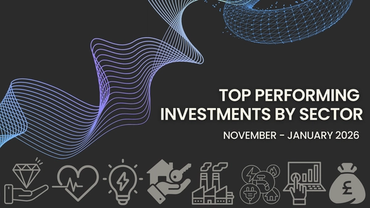The age of resilience: outperformers must first be survivors
Written by Tom Slater, Manager, Scottish Mortgage Investment Trust
23 Sep, 2025
This section is a paid promotion created in partnership with Baillie Gifford. The views and information presented reflect the sponsor’s messaging and may not represent the independent opinions of Boring Money. While we aim to ensure accuracy and relevance, this content should not be considered impartial advice.
As with any investment, your capital is at risk.

In 1921, Frank Knight, the Chicago School economist, defined the crucial difference between risk and uncertainty.
Risk – something that can be quantified and insured against – had always been the stuff of traditional economic modelling. But to Knight, it was uncertainty, meaning what no expert or analyst can ever measure, that rules the real world.
In our era, it’s manifest in pandemics, natural disasters, financial stresses, trade wars and real wars, all bouncing off each other in chaotic, unforeseeable ways.
His point was that uncertainty, “the inherent, absolute unpredictability of things”, creates opportunities for entrepreneurs. They are rewarded (along with their investors) for bearing the weight of the unknowable rather than for taking mere calculated risks.
It seems to Scottish Mortgage that we’re at a peak of ‘Knightian uncertainty’ right now, as geopolitical posturing heats up the global economy’s complex adaptive system. You can theorise about President Trump’s long-term objectives, but the truth is we don’t know the potential outcomes, and we certainly don’t know what probabilities to assign to them.
Getting comfortable with uncertainty
For me, having an edge as an investor comes from taking a different view from the market of a company’s potential, what the upside could be and what might happen if we’re right. We aim to see the value in an opportunity before others. That means getting comfortable with uncertainty. If a company faces predictable and quantifiable risks, the market will already agree on its value.
Our experience over the last few years has led us to think more deeply about the different characteristics of exceptional growth. The difficult period the Trust endured in the rising interest rate environment of 2022 – following an unusually long expansion – hasn’t changed our process. But it’s made us look harder at whether companies are resilient enough to adapt to whatever’s thrown at them.
Our willingness to back a company’s blue-sky vision is unchanged. But we’re more aware that it’s the business you’re running today, not the one you might have tomorrow, that must deal with problems along the way.

However great the opportunity, if a company can’t overcome inevitable bumps in the road, it won’t live to fulfil its potential. It’s about maximising chances.
A case in point from our portfolio is Northvolt, the Swedish battery maker that filed for bankruptcy in November last year. We shared founder Peter Carlsson’s vision of a European champion in a world increasingly turning to electric vehicles.
Our mistake was not foreseeing its vulnerability to weaker-than-forecast customer demand and operational problems that delayed its ramping up of capacity.
Anatomy of a resilient company
What does resilience look like? In practical terms, specific financial characteristics count. The questions we ask of companies are:
does it have debt or not?
does it have big enough margins to absorb the ebb and flow of sales?
does it generate cash?
However, there are wider cultural questions, often related to their being founder-led businesses. I’ve written before in Trust about how founders can make counterintuitive decisions and get an organisation to buy into change in a way that’s hard for professional managers. Our resilience checklist also asks of management:
are they nimble and adaptable?
do they rely on things continuing to be the way they’ve always been?
do they innovate?
are they competing in an industry or creating an industry?
Adaptability was vital in the high interest rate environment following the pandemic. Businesses needed to improve profitability to stay flexible. As it turned out, many were much more resilient than superficial financial metrics had suggested, and they’ve subsequently become much more profitable.
Shopify, the ecommerce sales platform, is a good example. Previously, it ran just below break-even and invested in many new projects. Now, it’s still investing and growing rapidly, but it’s switched to a model that manages to keep about 20 per cent of its revenue after covering operating costs. That extra cushion gives it the flexibility to adapt to new developments.

Meta, parent of Facebook and Instagram, is another. It had a ‘year of efficiency’ and addressed some of the weaker parts of its business and cost base. That puts it in a much better position to benefit from an improved operating environment.
Then there’s Cloudflare, the platform that protects and boosts online services. Previously making a small loss, its margins have climbed steadily over the past few years, helping it withstand whatever shocks are thrown at it.
Companies that make their own weather
Resilience means having options and the ability to make your own weather in challenging times. Ferrari needs to be sensitive to customer demand, but its brand power gives it many levers to pull to keep growing.
Oddity, the online makeup business, is thriving in a sector that’s been shrinking. It’s bringing something fresh to the market by enhancing ingredients with newly discovered molecules and using AI to personalise customer recommendations.
These companies show how you can still navigate a trickier environment with sufficient innovation. Because Netflix can add content that people love, it has flexibility around pricing. And it can choose the rate at which it commissions content.
Meituan, the local services and delivery business in China, exemplifies a different sort of resilience. Rivals such as ByteDance and JD.com have been attacking its core delivery markets. Because that had an impact on growth rates and margins, analysts reduced their ratings of the company.
The fact that it has fought off well-funded competition shows the strength and resilience of its business model. It bounced back in its financial metrics and in how the market assesses it. It’s an example of how an investor can outperform: seeing that a business’s resilience is worth more than others think.
I realise that this new emphasis could be read as Scottish Mortgage becoming more timid and risk-averse. Not so. We’re still searching great businesses whose future is uncertain but which can be wildly more successful than anybody else believes.
But the companies that hurt performance in recent years were often those whose vulnerability to changing circumstances ended their chance of fulfilling their potential. When the next crisis comes around, we want to be sure we don’t have too many such companies in our portfolio. It’s about increasing the odds of success by choosing which pools you fish in.
Amid turbulence, focus on what you can predict
I should add that there’s been no shortage of tough environments since I started investing in 2000. But you don’t survive for a quarter of a century in this industry without a degree of detachment and, yes, resilience.
You can work hard and do what you think is a good job, but things come out of left field, and you can do absolutely nothing about them. It’s not a career for everyone, especially now, as increased Knightian uncertainty causes markets to move short-term in crazy ways.
The economist Adam Tooze uses the term ‘polycrisis’ to describe how the economy’s underpinnings are under attack from all angles. The traditional order, he suggests, is breaking down as problems bubble up unpredictably. That’s the reality we must accept. There’s always something to worry about.
For us, it’s about focusing more on what we can predict. If we’re backing companies doing new things, in new ways, with uncertain outcomes, we need them to align with themes we are confident about. For example: we know AI will be more capable five years from now.
We know batteries in electric vehicles will be cheaper and have a greater range. We know cloud and data management software will become more powerful.
In an uncertain world, our job is to refine our understanding of how such long-run developments might play out, aware that only the most resilient will survive to thrive.
---
Important information
The views expressed in this article should not be considered as advice or a recommendation to buy, sell or hold a particular investment. The article contains information and opinion on investments that does not constitute independent investment research, and is therefore not subject to the protections afforded to independent research.
Some of the views expressed are not necessarily those of Baillie Gifford. Investment markets and conditions can change rapidly, therefore the views expressed should not be taken as statements of fact nor should reliance be placed on them when making investment decisions.
Baillie Gifford & Co Limited is wholly owned by Baillie Gifford & Co. Both companies are authorised and regulated by the Financial Conduct Authority and are based at: Calton Square, 1 Greenside Row, Edinburgh EH1 3AN.
The investment trusts managed by Baillie Gifford & Co Limited are listed on the London Stock Exchange and are not authorised or regulated by the Financial Conduct Authority.
A Key Information Document is available by visiting bailliegifford.com.






